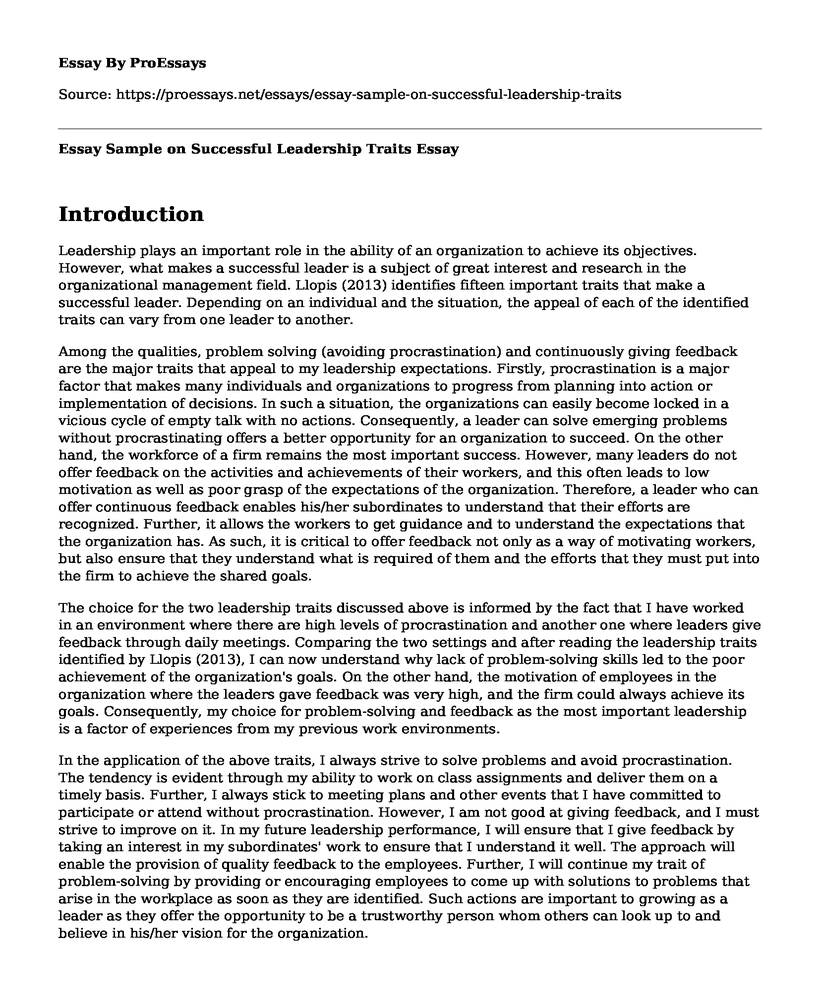Introduction
Leadership plays an important role in the ability of an organization to achieve its objectives. However, what makes a successful leader is a subject of great interest and research in the organizational management field. Llopis (2013) identifies fifteen important traits that make a successful leader. Depending on an individual and the situation, the appeal of each of the identified traits can vary from one leader to another.
Among the qualities, problem solving (avoiding procrastination) and continuously giving feedback are the major traits that appeal to my leadership expectations. Firstly, procrastination is a major factor that makes many individuals and organizations to progress from planning into action or implementation of decisions. In such a situation, the organizations can easily become locked in a vicious cycle of empty talk with no actions. Consequently, a leader can solve emerging problems without procrastinating offers a better opportunity for an organization to succeed. On the other hand, the workforce of a firm remains the most important success. However, many leaders do not offer feedback on the activities and achievements of their workers, and this often leads to low motivation as well as poor grasp of the expectations of the organization. Therefore, a leader who can offer continuous feedback enables his/her subordinates to understand that their efforts are recognized. Further, it allows the workers to get guidance and to understand the expectations that the organization has. As such, it is critical to offer feedback not only as a way of motivating workers, but also ensure that they understand what is required of them and the efforts that they must put into the firm to achieve the shared goals.
The choice for the two leadership traits discussed above is informed by the fact that I have worked in an environment where there are high levels of procrastination and another one where leaders give feedback through daily meetings. Comparing the two settings and after reading the leadership traits identified by Llopis (2013), I can now understand why lack of problem-solving skills led to the poor achievement of the organization's goals. On the other hand, the motivation of employees in the organization where the leaders gave feedback was very high, and the firm could always achieve its goals. Consequently, my choice for problem-solving and feedback as the most important leadership is a factor of experiences from my previous work environments.
In the application of the above traits, I always strive to solve problems and avoid procrastination. The tendency is evident through my ability to work on class assignments and deliver them on a timely basis. Further, I always stick to meeting plans and other events that I have committed to participate or attend without procrastination. However, I am not good at giving feedback, and I must strive to improve on it. In my future leadership performance, I will ensure that I give feedback by taking an interest in my subordinates' work to ensure that I understand it well. The approach will enable the provision of quality feedback to the employees. Further, I will continue my trait of problem-solving by providing or encouraging employees to come up with solutions to problems that arise in the workplace as soon as they are identified. Such actions are important to growing as a leader as they offer the opportunity to be a trustworthy person whom others can look up to and believe in his/her vision for the organization.
Conclusion
Consequently, with the recognition of the important traits of successful leaders, I believe that problem solving and giving feedback are the most important. Problem-solving allows a leader to address challenges as they arise while offering feedback is critical for a highly motivated workforce. As such, I will seek to implement the traits for my growth as a leader.
References
Llopis, 2013, February 18). The most successful leaders do 15 things automatically, every day. Forbes. Retrieved from https://www.forbes.com/sites/glennllopis/2013/02/18/the-most-successful-leaders-do-15-things-automatically-every-day/#71d253aa69d7
Cite this page
Essay Sample on Successful Leadership Traits. (2022, Jun 26). Retrieved from https://proessays.net/essays/essay-sample-on-successful-leadership-traits
If you are the original author of this essay and no longer wish to have it published on the ProEssays website, please click below to request its removal:
- Essay Sample on Small and Diverse Groups
- Ethics in Leadership Decision-Making - Essay Sample
- Essay Example on 21st Century: Knowledge a Common Denominator in Decision Making
- Essay Example on Maximizing Team Performance With Lean System: Achieving Goals Together
- Essay on 20% Stock Market Edge: Corporate Ethics & Organizational Culture
- Essay Example on Organizational Culture: A Key Factor in Success and Fraud
- Essay Example on The US Presidential Award: Unveiling the History of the Malcolm Baldrige National Quality Award







